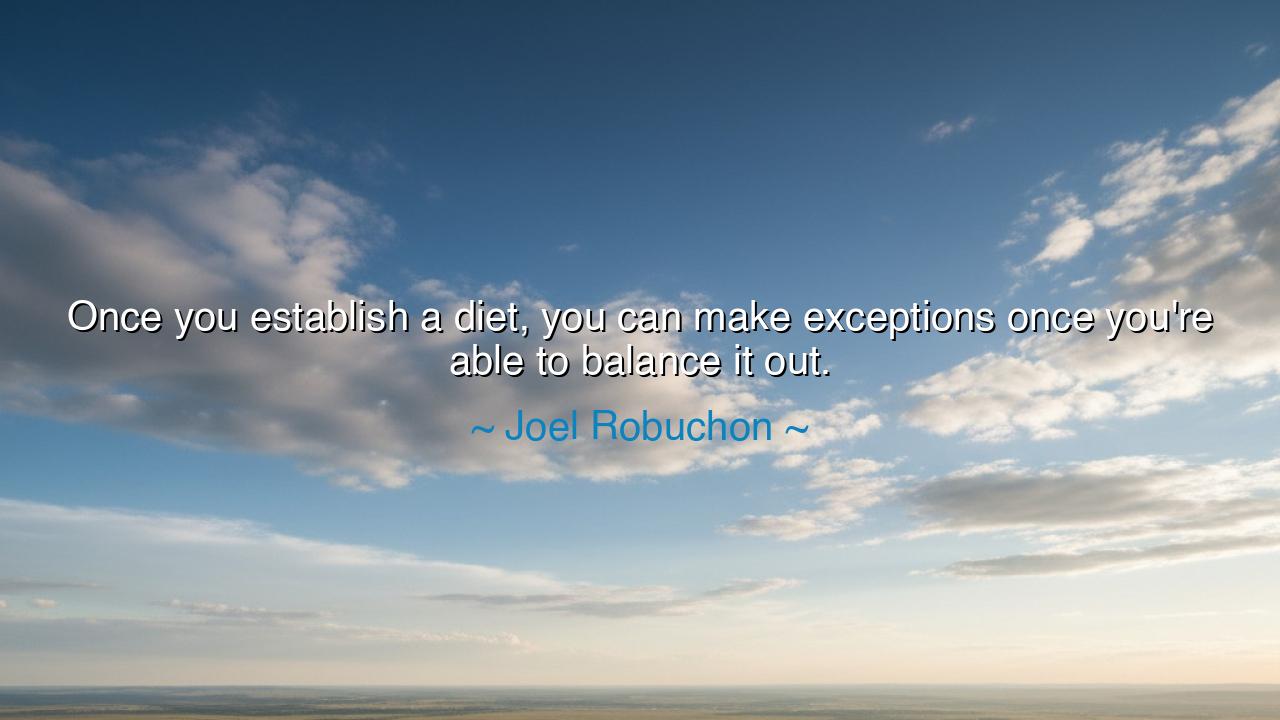
Once you establish a diet, you can make exceptions once you're






Listen, O children of wisdom, to the words of Joel Robuchon, a master of the culinary arts, who teaches us a profound truth: "Once you establish a diet, you can make exceptions once you're able to balance it out." In these words lies a deep lesson about the nature of discipline and balance. Diet, in this context, is not merely a set of rules about what to eat, but a guide—a structure—by which one can navigate the sometimes tumultuous seas of desire and temptation. Yet, true mastery of the self is not about rigid adherence, but about knowing when to bend and when to yield, all the while maintaining the balance that allows us to remain healthy, both in body and spirit.
In the ancient world, the great thinkers understood the necessity of balance in all things. Aristotle, the philosopher of moderation, spoke often of the Golden Mean—the idea that virtue lies in finding the middle ground between excess and deficiency. Just as Aristotle taught that the wise man is not one who abstains completely from indulgence, but one who knows how to balance his desires, so too does Robuchon remind us that in life, there is room for exceptions. When we have built a foundation of discipline, we are not enslaved by our desires, but we gain the wisdom to choose when it is right to indulge, knowing that a single exception does not undo the balance we have worked hard to create.
Consider the example of the Spartan warriors, known for their unwavering discipline and strength. Their lives were governed by strict rules, from their diet to their daily training, yet they understood that true strength was not just about rigid adherence to rules but about adaptation and understanding the deeper needs of the body. Even the Spartans would take moments to rest, to feast, or to relax, knowing that these exceptions, when balanced correctly, strengthened their resolve and kept their bodies ready for the next challenge. Their discipline was not about perfection, but about balance, just as Robuchon speaks of when he advises that one can make exceptions once balance is established.
The same can be said for the ancient Romans, whose lives were shaped by the twin pillars of order and moderation. Cicero, the Roman orator and philosopher, often wrote about the importance of balance in life, believing that neither indulgence nor abstinence should govern the soul. In his writings, he extolled the virtues of enjoying life’s pleasures, but with restraint—for it is through restraint that one maintains the balance necessary for true happiness. Robuchon echoes this Roman wisdom, showing us that a disciplined approach to eating—one that focuses on balance and self-awareness—can lead to greater joy and fulfillment. By building a foundation of healthy habits, we give ourselves the freedom to enjoy life's pleasures without losing sight of the bigger picture.
In the context of our own lives, we too face the challenge of finding balance between discipline and indulgence. In our pursuit of health, whether physical, mental, or spiritual, we are often confronted with choices that test our commitment to a well-balanced life. Just as the ancients did, we must learn to balance our desires, knowing that true mastery is not in the complete denial of pleasure, but in the conscious and thoughtful choices we make. Robuchon’s wisdom offers us the key: once we have established a solid foundation—whether in diet, exercise, or any other area of life—there is room for occasional exceptions, so long as we understand the importance of returning to balance.
In this, we find the heart of Robuchon’s teaching: discipline gives us the freedom to make choices that enhance our lives. It is only when we have built a strong foundation of healthy habits that we can afford to make exceptions without feeling guilty or losing our way. The key is not to deprive ourselves of life’s joys, but to approach them with wisdom and balance. Just as the ancient sages taught, we must strive for a life of moderation—not perfection, but an understanding that true fulfillment comes from living with balance, knowing when to indulge and when to restrain.
Therefore, O future generations, take this lesson to heart: build a foundation of discipline, whether in your diet, your work, or your relationships, and let this discipline become the structure upon which you build a life of joy and fulfillment. Know that in balance lies the secret to living well, and that it is not in the rigid pursuit of perfection that we find peace, but in the ability to adapt and to make exceptions when the moment calls for them. Let Robuchon’s wisdom guide you to live with both restraint and joy, so that in the dance of life, you may find the true balance that leads to lasting peace and happiness.






AAdministratorAdministrator
Welcome, honored guests. Please leave a comment, we will respond soon